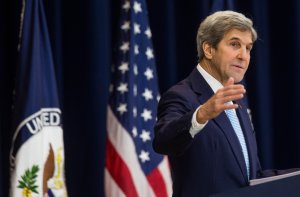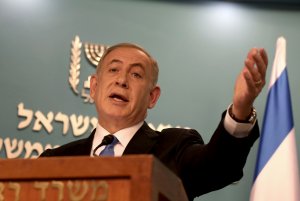With less than a month left in office, Secretary of State John Kerry issued a stern rebuke Wednesday over Israeli settlements and warned that the two-state solution to the enduring conflict with Palestinians is at risk.

Kerry defended the United States’ decision last week to abstain from a vote on — and not veto — a UN resolution condemning Israeli settlements in the West Bank and East Jerusalem as one aimed at “preserving the two-state solution,” which he called “the only way to achieve a just and lasting peace between Israelis and Palestinians.”
“I am also here to share my conviction that there is still a way forward if the responsible parties are willing to act,” Kerry said, opening his speech.
But he underscored his optimism with a warning: “Despite our best efforts over the years, the two-state solution is now in serious jeopardy.”
Israeli Prime Minister Benjamin Netanyahu fired back, deriding Kerry’s speech as “skewed against Israel” in a statement Wednesday.
“For over an hour, Kerry obsessively dealt with settlements and barely touched upon the root of the conflict — Palestinian opposition to a Jewish state in any boundaries,” Netanyahu said.
Netanyahu also signaled his support for the incoming Donald Trump administration, saying, “Israel looks forward to working with Trump to mitigate the damage this resolution has done and ultimately to repeal it. We hope the outgoing Obama administration will prevent any more damage.”
The back-and-forth was a remarkable moment in US-Israeli relations. Kerry and Netanyahu were unusually candid in articulating the perceived shortcomings of the other side. The dueling speeches essentially offered both countries the opportunity to unleash nearly eight years of tension that has built up under the Obama administration. And it played out just over three weeks before Trump takes office with a pledge to work more closely with Netanyahu.
‘That’s how we work’
Kerry called on both Israelis and Palestinians to take steps showing the seriousness of their commitment to a two-state solution, such as complying with the terms of the Oslo Accords. He put forward six principles he argued should guide future negotiations, including secure borders for both an Israeli and Palestinian state, a “fair and realistic” solution to the question of Palestinian refugees and establishing Jerusalem as an “internationally recognized capital of the two states.”
Kerry also ruled out the possibility the US would join efforts to dictate peace terms at the UN Security Council or that the US would recognize a Palestinian state without a negotiated agreement.
“The incoming administration has signaled that they may take a different path, and even suggested breaking from long-standing US policies on settlements, Jerusalem — and possibly the two-state solution,” Kerry said. “That is for them to decide. That’s how we work.”
Kerry acknowledged as much, noting Trump has signaled a break with long-standing US policies toward the conflict.
Trump, in his latest breach of presidential transition protocol, made clear on Twitter Wednesday morning ahead of Kerry’s speech that change was on the way.
“We cannot continue to let Israel be treated with such total disdain and disrespect. They used to have a great friend in the U.S., but not anymore. The beginning of the end was the horrible Iran deal, and now this (U.N.)!” Trump tweeted. “Stay strong Israel, January 20th is fast approaching!”
Asked about the speech later Wednesday at his Mar-a-Lago resort in Florida, Trump said it “speaks for itself.”
Congress is taking steps to back Trump’s approach. House Republicans are looking to bring up a non-binding House resolution condemning a recent vote at United Nations that has caused intense blowback from Israel.
Kerry on Wednesday offered the US’s most direct rejection of Israeli claims that the US worked behind the scenes to guide the UN resolution to passage and criticized those claims as an attempt to “distract attention from what the substance of this vote really was all about.”
“The United States did not draft or originate this resolution, nor did we put it forward,” he said, adding that the US simply made it clear to the resolution’s sponsors that “if the text was more balanced, it was possible we wouldn’t block it.”
Kerry bemoans conflict’s status quo
Kerry lamented the status quo in Israel and the Palestinian territories, drawing on personal experiences as he criticized Israeli and Palestinian actions he said hurt chances for a two-state solution.
He pointed to the conflict’s impact on children in both Israel and the Palestinian territories — from Israeli children facing rocket fire and must rush to shelter at the sounding of a siren, to destruction in the Gaza Strip, where he said he remembered seeing Palestinian children playing in the rubble.
Kerry argued that current Israeli settlement policy in the region was leading toward a future of “one state and perpetual occupation” and slammed the arguments of right-wing Israeli officials who argue settlements are aimed at bolstering Israel’s security. He also reserved special criticism for Netanyahu, whose governing coalition Kerry called “the most right-wing in Israeli history, with an agenda driven by the most extreme elements.”
“They’re leading towards one state,” he said.
And the secretary of state also pointed to the recent rapid growth of settlements east of the 1967 borders, which have long been seen as the basis for the territory of a future Palestinian state alongside Israel.
He noted that the Israeli settler population in the West Bank has grown by 270,000 since the Oslo Accords of the 1990s.
But while he argued that settlements furthered the likelihood of a one-state solution that would jeopardize Israel’s status as both a Jewish and democratic state, Kerry stressed that settlements are not “the whole or even primary cause of this conflict.”
Kerry also acknowledged that Palestinian leaders, including the moderate Fatah faction that rules the West Bank, continue to glorify Palestinian terrorists who carry out attacks against Israeli civilians.
Defending the Obama administration
The outgoing secretary of state’s speech at the State Department comes amid heightened tensions between the US and Israeli administrations over the UN resolution vote.
And Kerry sought to push back against arguments that the abstention amounted to a US betrayal of Israel.
He defended the administration’s commitment to Israel, arguing that “no American administration has done more for Israel’s security than Barack Obama’s” and noting that Netanyahu has acknowledged as much as it comes to US security cooperation and military aid.
Kerry had planned to give the speech last Thursday, when the vote was originally planned. Those plans got scrapped after the proposal’s original sponsor, Egypt, forced a delay for a day.
Regarding the timing of Kerry’s speech, two White House sources told CNN the Obama administration wanted to make it clear where it stands on the Israeli-Palestinian issue as a matter of principle and as a matter of history.
Netanyahu responds

Netanyahu offered a quick reply to Trump’s tweet earlier Wednesday morning vowing stronger US backing for the Jewish state, thanking Trump on Twitter for his “warm friendship” and “clear-cut support.”
And after Kerry spoke, Netanyahu derided the speech as “skewed against Israel,” arguing that Israel doesn’t need “to be lectured by foreign leaders.” Netanyahu insisted Palestinian leaders were the “root of the problem,” not Israel’s government.
“In these days of the Hanukah holiday, the light must overcome the darkness, and Israel’s light must overcome all challenges with the Jewish Menorah lights I would like to bring light in the world,” he added.
Deputy speaker of the Knesset Ahmad Tibi, one of the most influential Arab members of Israel’s parliament, slammed Netanyahu for deriding Kerry’s speech, pointing to opposition among Democrats in the US to Israel’s settlement policy.
“Let’s face the facts: Israel is upset because this American action advances freedom and equal rights for Palestinians,” Tibi said.
Netanyahu’s government has said in recent days Israel will provide detailed, sensitive information to the incoming Trump administration to bolster their claims that the US played a covert role in pushing passage of the UN Security Council resolution on Israel. The Obama administration has denied any such involvement.
Netanyahu’s outrage, though, has played out publicly. The Israeli prime minister launched a scathing attack on the Obama administration on Sunday and summoned the US ambassador to a face-to-face meeting.






